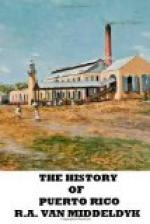The manifesto terminates with an assurance to the Spanish people that, under the new law, heresy would not go unpunished; that, under the new system of judicial proceedings, the innocent would no longer be confounded with the criminal. " ... There will be no more voluntary errors, no more suborned witnesses, offenders will henceforth be judged by upright magistrates in accordance with the sacred canons and the civil code ... Then, genius and talent will display all their energies without fear of being checked in their career by intrigue and calumny; ... science, the arts, agriculture, and commerce will flourish under the guidance of the distinguished men who abound in Spain ... The king, the bishops, all the venerable ecclesiastics will instruct the faithful in the Roman Catholic Apostolic religion without fear of seeing its beauty tarnished by ignorance and superstition, and, who knows, this decree may contribute to the realization, some day, of religious fraternity among all nations!”
From this beautiful dream the Cortes were rudely awakened the very next year when King Ferdinand VII, replaced on his throne by the powers who formed the holy alliance, entered Madrid surrounded by a host of retrograde, revengeful priests. Then the Regency, the Cortes, the Constitution were ignored. The deputies were the first to suffer exile, imprisonment, and death in return for their loyalty and liberalism; the public press was silenced; the convents reopened, municipalities and provincial deputations abolished, the Jesuits restored, the Inquisition reestablished, and priestcraft once more spread its influence over the mental and social life of a naturally generous, brave, and intelligent people.
FOOTNOTES:
[Footnote 80: Neumann, p. 205.]
CHAPTER XXXIX
GROWTH OF CITIES
The proceedings in the formation of a Spanish settlement in the sixteenth century were the same everywhere. For the choice of a site the presence of gold was a condition sine qua non, without gold, no matter how beautiful or fertile the region, no settlement was made.
When a favorable locality was found the first thing done was to construct a fort, because the natives, friendly disposed at first, were not long in becoming the deadly enemies of the handful of strangers who constituted themselves their masters. The next requisite was a church or chapel in which to invoke the divine blessing on the enterprise, or maybe to appease the divine wrath at the iniquities committed. Last, but certainly not least in importance, came the smelting-house, where the King of Spain’s share of the gold was separated.
Around these the settlers grouped their houses or huts as they pleased.




